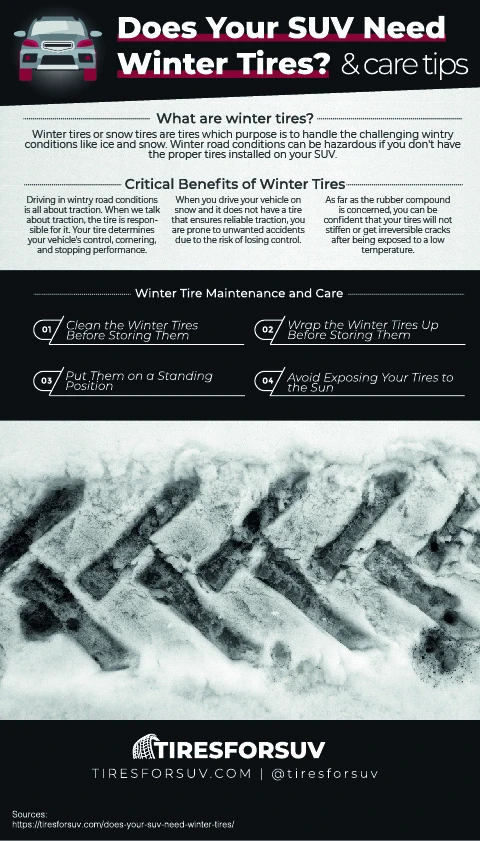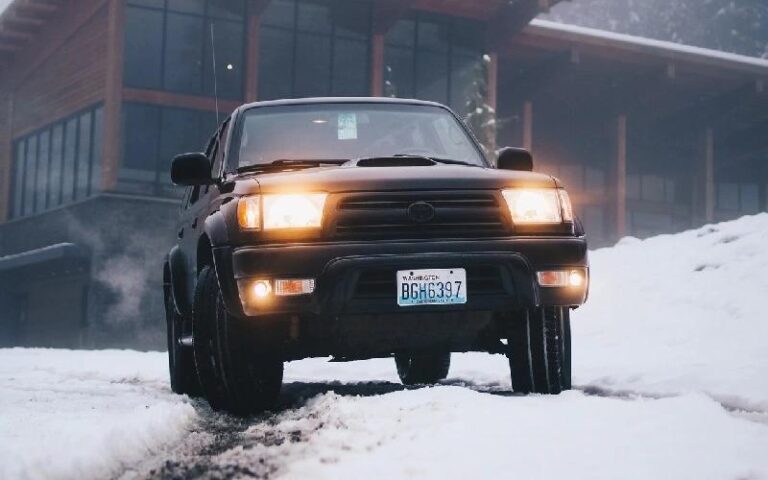Are you one of those who wonder if winter tires are a must for your SUV? You probably hear other enthusiast drivers who insist that winter tires are best for SUVs. So, back to the question, are winter tires required for SUVs?
You can, of course, choose the type of tire to mount on your vehicle. Winter tires aren’t a requirement for your SUV, especially if you are not in a state that frequently experiences snow. However, if you often drive in wintry conditions, winter tires are the best to give you maximum winter performance.
Winter tires feature deep treads and a pliable rubber compound that provide the necessary traction on ice and snow. According to a study conducted by the Quebec Ministry of Transport in Canada, dedicated winter tires improve braking by 25 percent.
Let’s explore further what winter tires are and why they are ideal for your SUV.
What Are Winter Tires?
Winter tires or snow tires are tires which purpose is to handle the challenging wintry conditions like ice and snow. Winter road conditions can be hazardous if you don’t have the proper tires installed on your SUV.

Winter tires feature a flexible silica compound that can provide you with enhanced grip and control over the challenges of winter conditions.
The rubber compound can remain pliable even at the lowest temperature. Thus, it can maintain its traction as it does not stiffen like the rubber compound used on summer tires.
The tread patterns on winter tires are intentionally deep to improve their grip further. The deep treads also feature multiple sipes that serve as biting edges for a firmer grip.
Critical Benefits of Winter Tires
Driving in wintry road conditions is all about traction. When we talk about traction, the tire is responsible for it. Your tire determines your vehicle’s control, cornering, and stopping performance.
When you drive your vehicle on snow and it does not have a tire that ensures reliable traction, you are prone to unwanted accidents due to the risk of losing control.
As far as the rubber compound is concerned, you can be confident that your tires will not stiffen or get irreversible cracks after being exposed to a low temperature. Thus, it is more economical than using a summer tire which can be prone to irreparable damage.
The most crucial benefit of all is the safety it provides. Driving in challenging road conditions during winter simply becomes safer with winter tires installed on your vehicle.
Switching to Winter Tires
Not that you learned about the safety benefits of having winter tires on your SUV, you probably are convinced to switch to winter tires. The next question is: Do you need to change all four of your tires to winter tires?
Some drivers argue that it is not necessary to replace all four of your tires with winter tires. However, experts suggest that it is best to install winter tires on all wheel positions.
Why is a complete set of winter tires ideal? The answer is simple: installing just two could mean losing some traction, stopping, and cornering advantages, and I think it requires no further explanation.
Winter Tire Maintenance and Care
If you have decided to switch to winter tires, you must learn some tips on how to take care of your winter tires. Some drivers ask if they can keep their winter tires on their vehicles when the winter season is over.
Winter tires are for winter conditions, thus driving them in different weather conditions is not ideal. You will risk damaging it, and it will not be an economical choice.
Do not wait too long to remove them. It is best to remove your winter tires and replace them with your standard summer tires when the winter is over.
Check out below some tips on how to properly store your winter tires after removing them.
Clean the Winter Tires Before Storing Them
It may sound unnecessary as winter tires will probably just have snow that will simply melt away. However, the road gunk that you fail to clean up may cause damage if it sits on your tires for too long. Thus, cleaning them helps protect and prolong the life of your tires.
Wrap the Winter Tires Up Before Storing Them
Why do you need to do this? Wrapping your tires up will help prevent the evaporation of the lubricating oils found within the tires.
You can use large garbage bags to wrap your tires up. Alternatively, you can purchase tire tote bags if you want something that would last longer.
Put Them on a Standing Position
According to experts, it is best to store your tires standing up. This way will put less pressure on the tires. It is more prone to damage if you stack your tires up.
However, if the tires are on the rims, you should store them stacked up rather than upright.
Hang Them Up
If you have limited space for storing your winter tires, it is best to hang them up. You can do so by using large hooks. This method is an ideal technique if your tires are not on the rims.
If you have not removed the tires from the rims, it is best to stack them up to avoid stress and damage to the tires.
Avoid Exposing Your Tires to the Sun
I guess you understand that the ray of the sun can do some damage to your tires. The compound used in winter tires could not stand extreme temperatures, and it may cause irreversible damage.
Conclusion
Installing winter tires on your SUV is not a requirement, but it gives you an enhanced level of safety. Only winter tires can provide you the required traction when you drive in wintry road conditions.
Winter tires feature deep treads with multiple sipes that serve as biting edges to ensure a firm grip over ice or snow. The rubber compound that it uses could stand low temperatures and can provide improved grip and traction.
It is essential to remove your winter tires when winter is over and store them up properly.

